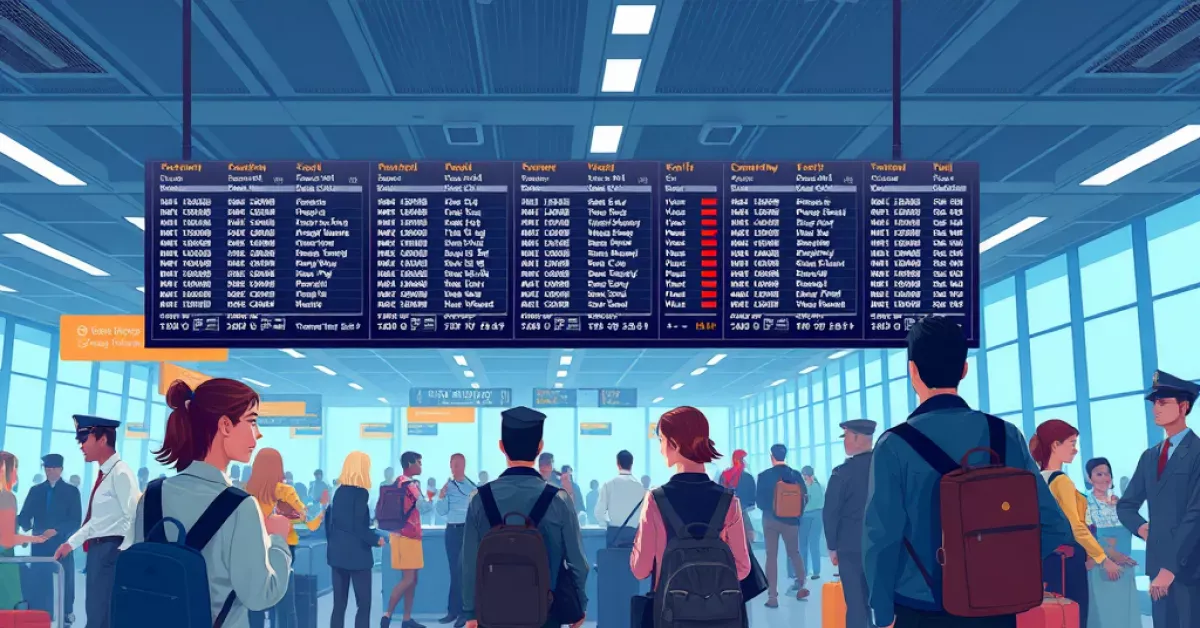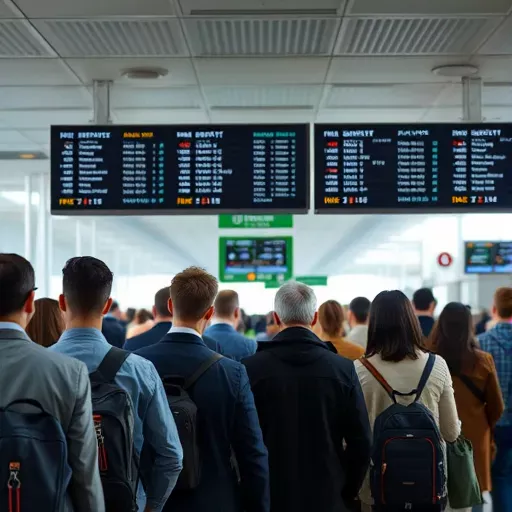Ever booked a flight and found yourself bumped off last minute, or pocketed some cool travel credits for it? That’s what we call airline overbooking, a practice that might seem unfair but has some fascinating reasons behind it, as well as nifty strategies to make it work. Let’s dive into the world of overbooking and unravel its mysteries.

Decoding the Upside of Airline Overbooking
Balancing Act: Maximising Occupancy vs. Managing Cancellations
Airlines often face a tricky challenge: ensuring every seat on the plane is filled while also dealing with passengers cancelling or simply not showing up. This delicate balancing act involves carefully overbooking flights to make sure that even if some travellers don’t turn up, the plane doesn’t fly with empty seats. With margins tight in the airline industry, making sure each seat is sold is crucial for profitability.
Behind the Overbooking Decision: Historical Data and Trends
To nail the overbooking balance, airlines use a mix of historical data and trends. This involves studying passenger behaviour, like no-show rates and cancellation patterns, from past flights. By analysing these trends, airlines can predict flight occupancy and adjust the number of tickets sold accordingly. It’s a bit like a rather complex game of chess, where predicting the next move can lead to better outcomes for everyone, including passengers who might get bumped for a better deal.
Airline Strategies for Overbooking Success
Appeasing the Bumped: Travel Credits and Rebooking
Getting bumped from a flight isn’t all bad news. Airlines often offer travel credits or alternative bookings to entice passengers to voluntarily switch flights. These offerings not only keep passengers happy but also ensure airlines maintain their bottom line by avoiding an even bigger headache—delays or an unsold seat. Many seasoned travellers use these opportunities to bag some enticing perks, turning an initial inconvenience into a pleasant bonus.
How Flight Management Supports Overbooking
Flight management teams work tirelessly behind the scenes to support overbooking. They continually refine strategies to maximise passenger satisfaction while ensuring efficiency. These professionals use complex software and models to adjust for real-time changes in booking patterns, ultimately aiding smooth operations across airports. It’s these unseen efforts that keep the hustle and bustle of air travel moving smoothly and mitigate the effects of overbooking.
Behind-the-Scenes Look at Airline Operations
Continuous Refinement of Overbooking Practices
Overbooking is a practice that’s forever evolving. Airlines consistently improve their techniques, driven by advancements in technology and feedback from past experiences. By updating their overbooking strategies, airlines aim to minimise disruptions and enhance the passenger journey. They use simulations, models, and even trial-and-error methods to reach the sweet spot, maintaining optimal service levels for passengers.
Passenger Impact: Inconveniences and Benefits
Overbooking can mean different things for different travellers. For some, it’s unexpected delays and missed connections, causing stress and frustration. For others, it’s an opportunity for free flight vouchers or upgrades, enhancing their travel experience. While inconveniences are part of the game, the chance for free miles or an upgraded seat can indeed sweeten the deal, giving overbooking an unexpected silver lining.

Understanding Reservation Systems in Overbooking
The Mechanics of Demand Management
Travel demand is far from constant, with peaks and troughs throughout the year. Airlines use reservation systems to track this demand and accommodate as many passengers as possible, often using dynamic pricing to adjust fares based on expected demand. Such systems help airlines implement overbooking deftly, ensuring the maximum number of filled seats while preparing for potential no-shows.
Cancelled Flights as Safety Nets
Sometimes, cancelled flights act as a buffer in the overbooking matrix, allowing airlines to shuffle resources and manage passenger flow better. With these cancellations serving as im promptu safety nets, airlines can strategically arrange passengers onto other flights without leaving anyone in the lurch. It’s a smart use of flight schedules that enhances efficiency and reduces financial loss.
Industry Secrets: Flight Planning Unveiled
Boarding Priorities in Overbooked Situations
Every overbooked flight comes with a set of boarding priorities. Elite frequent flyers, families, and passengers with medical needs usually get the first say, ensuring they board the flight despite overbooking. This system allows airlines to keep their loyal customers satisfied and uphold their duty of care, all while managing the chaotic air travel environment.
Aligning Overbooking with Airline Profitability
Profit is undeniably at the heart of overbooking. By aligning overbooking with strategic flight planning, airlines aim to strike a balance between operational efficiency and financial performance. Every filled seat contributes to profitability, especially in low-margin markets. As such, overbooking helps maintain an economically sound flight schedule, keeping flights affordable and options broad for everyday travellers.

The Growing Phenomenon of Overbooking Waves
Adapting to Fluctuating Demand Seasons
Peak travel periods, like school holidays and festive seasons, see a surge in demand, prompting airlines to adjust overbooking with seasonal fluctuations. During these times, airlines broaden their overbooking strategies to accommodate the seasonal rush. Being flexible with ticket sales allows them to respond to demand without the fear of revenue loss from empty seats. It’s a strategic practice that requires deft handling to meet varying passenger needs.
Practical Bumping Advice: Communicate for Solutions
For those faced with a bump from an overbooked flight, communication is key. Direct interaction with airline staff can often lead to satisfactory solutions, like better perks or upgraded journeys. Be proactive, ask about potential compensation, and explore rebooking options. Many passengers find success by keeping calm and discussing viable options actively with airline representatives.
Top Tips for Travellers Facing Overbooking:
- Understand the Policy: Familiarise yourself with the airline’s overbooking terms before flying.
- Arrive Early: Early arrival can improve your chances of staying on your original flight.
- Communicate: Discuss with gate agents to explore your options and negotiate for compensation.
- Stay Flexible: Be open to rescheduling in exchange for benefits like flight vouchers.
- Stay Informed: Keep tabs on travel alerts and flight updates.
Demand Management Techniques to Curb Overbooking
Dynamic Pricing and Targeted Marketing
To curtail excessive overbooking, airlines leverage dynamic pricing, which modifies ticket prices according to demand spurts and lulls. They engage in targeted marketing to attract specific passenger segments, making for more predictable booking patterns. This helps ensure flights aren’t oversold beyond capacity and that occupancy is optimised strategically.
Boarding Priorities: Decision Making in Oversold Flights
Decision-making in oversold flights boils down to clear boarding priorities. Airlines maintain a list of key passengers who receive precedence in boarding, be it based on frequent flyer status or specific needs. This structured approach ensures a fair distribution of available seats and maintains passenger satisfaction despite complex overbooking conditions.
Crafting Informed Flight Choices to Avoid Overbooking
Passenger and Crew Experiences: Humanising Overbooking Dilemmas
The world of overbooking is not just about numbers and systems. It’s an amalgam of stories from passengers and crew members alike. Passengers, sometimes exasperated, learn the nuances of adaptability; while crew members skillfully handle delicate situations, bringing a human touch to technical dilemmas. Empathy, mutual understanding, and open communication could turn a bump from inconvenience into a memorable and rewarding travel experience.
As travellers, understanding the dynamics behind overbooking allows us to navigate its challenges smoother. With insights into airline strategies, reservation systems, and periodic demand surges, everyone can become a savvy flyer, ready to turn potential travel hiccups into opportunities. When embarking on your next adventure, embrace the flow of air travel, armed with knowledge and optimism to make the skies friendlier than ever. Safe travels!